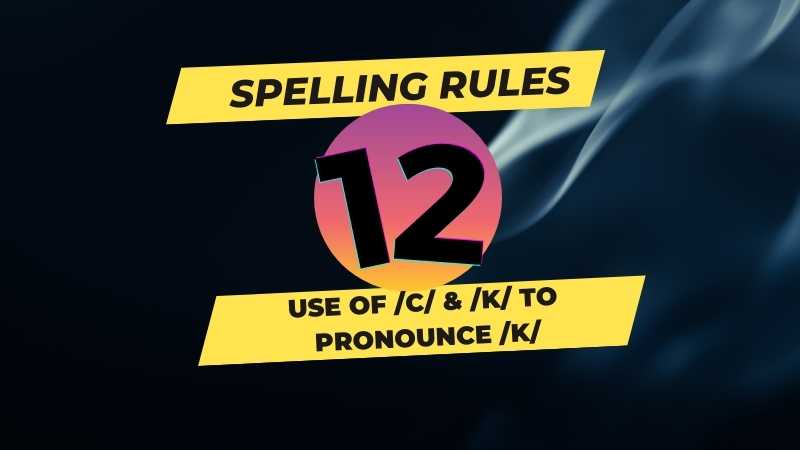Spelling Rule-12: Rules for using C or K to pronounce K
Before discussing this rule, first remember Spelling Rule-4: Two sounds of “C”, which says:
Spelling Rule-4.1: If /C/ followed by e,i or y sounds as /s/
Spelling Rule-12.1: If /C/ is not followed by e,i or y sounds as /K/ and can be used in place of /K/
Examples:
car
cash
cat
clap
clock
club
coin
corn
cot
crab
cross
crow
cut
cue
Spelling Rule-12.2: /K/ needs a back support to stand in the following formart:
1. consonant + K (Example: click, task)
2. vowel + vowel + K (Example: book, seek)
3. vowel + K+ vowel (Example: bike, cake)
Spelling Rule-12.3: First try to use C, if not possible use K
Example:
Konark- Try to use /C/ first- Conark- it became pronounced as /SONARK/ as per Spelling Rule: 4.1. So, use /K/
Examples:
Cup, Cat, Crown, Climb
Spelling Rule-12.4: To keep the short vowel sound and /K/ sound at after short vowel, use /CK/
Example:
attack, sack, snack, black, lack, flack, shack, whack, neck, wreck, heck, peck, sick, brick, click, flick, trick, lock, dock, block, rock, shock, crock, stuck suck, luck, muck, duck, etc.
Notice they all have short vowel sounds next to the -ck ending.
We also have words with more than one syllable ending with -ck and with the short vowel sound next to the –ck:
attack, Cossack, ransack, shamrock, shylock, paddock, gimmick.
Remember when we have a short vowel sound, we usually double up the end consonant when we add suffixes to indicate the short vowel sound (Spelling Rule-8):
sit sitting pat patter nip nipped.
Spelling Rule-12.5: To keep the short vowel sound, don’t double the /C/ or /K/ and use /CK/
Example:
attack, sack, snack, black, lack
Short vowel sound before –ck- in the middle of words:
jacket, package, packet, bracket, lackadaisical, lackey, mackerel, ticket, wicked, snicker cricket, picket, hickory, docket, hockey.
The exceptions to the single vowel + “k” endings are in foreign borrowed words: trek/trekking, anorak, Bolshevik, yak, yuk
Spelling Rule-12.6: In two or more syllables word, to keep the short vowel sound, use /C/ only instead of /CK/ to keep the word short.
Example:
2 syllables: magic, music, static, traffic, panic, frolic, mimic, picnic, critic, frantic, ethic, tonic, tropics, clinic, public, rustic, graphic
3 syllables: electric, acoustic, ballistic, dramatic, genetic, hysterics, politics, semantics, Atlantic, Pacific, mechanic, heroic, poetic, athletic, angelic, atomic, authentic, melodic, dogmatic, traumatic, erratic, eccentric, elastic, domestic, organic, hypnotic, fantastic
4 syllables: cybernetic, economic, mathematics, aromatic, problematic, periodic, sympathetic
Also we have some -ac ending. lilac maniac bivouac almanac zodiac
Important Note-1:
As, we dropped the /K/ to keep the word short, but when adding suffixes like -er, -ed, -ing, we again call the /K/ to keep the /K/ sound and to avoid /S/ sound.
picnic – picnicked, picnicking, picnicker
panic – panicked, panicking, panicky
traffic – trafficked, trafficking, trafficker
bivouac – bivouacked, bivouacking
Important Note-2:
When we add other suffixes we don’t add “k.” frolicsome, mimicry, picnics
We add –ally to –ic to make adverbs: automatic – automatically
frantic – frantically dramatic – dramatically
Spelling Rule-12.7: Never see -ck at the beginning of words
Spelling Rule-12.8: For long vowel sounds, use the silent-e rule and write /-KE/
Examples:
make, bake, cake, take, flake, awake, mistake, puke, fluke, duke, rebuke,
choke, artichoke, joke, smoke, like, hike, bike, dike, Mike.
But Drop the E with -ing, -ed, -er -able, -ible etc. suffixes
Examples:
making, maker, baking, baker, baked taking, taker, mistaken, flakey, puking, hiking, choking, joking.
Spelling Rules
Spelling Rule- Before You Start: Part-A
Spelling Rule- 1: Syllables
Spelling Rule- 2 : English Words Never end with
Spelling Rule- 3 : “Y” acts as a consonant as well as a vowel
Spelling Rule- 4 : Two sounds of “C”
Spelling Rule- 5 : Two sounds of “G”
Spelling Rule- 6 : Magic-E/Silent-E
Spelling Rule- 7 : Drop the “e” rule
Spelling Rule-8: The 1:1:1 doubling-up rule
Spelling Rule-9: A E O U at the end of the Syllable
Spelling Rule-10: The Rabbit rule
Spelling Rule- Before You Start: Part-A
Spelling Rule- 11: The FLOSS/FLSZ rule
Spelling Rule- 12 : Use of C or K to pronounce K
Spelling Rule- 13: Use of /CH/ & /TCH/
Spelling Rule- 14: Use of /Cial/ & /Tial/
Spelling Rule-15: Two vowel’s sounds
Spelling Rule- 16 : Short Vowel Sounds
Spelling Rule- 17 : Long Vowel Sounds
Spelling Rule-18: Vowels in Short Words
Spelling Rule-19: Long Vowels’ Rules and Patterns
Spelling Rule-20: W is the Boss

